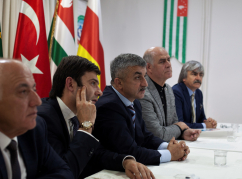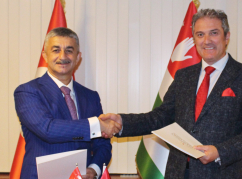You can learn about the goals and objectives of the World Abaza Congress (WAC), the repatriation of Abkhazians and Abazins, the strengthening of their ties and the preservation of the language in an interview with the Executive Secretary of the WAC, Inar Gitsba.
Interview by Asta Ardzinba.
- My first question is directly about the present and future of the World Abaza Congress (WAC). In particular, what would you define as the main goals and tasks of the organization to date?
- WAC as an organization uniting the representatives of our people living in different parts of the world should correspond to the challenges and processes that are directly related to each representative of our people.
As for the goals and objectives at this stage, it is first of all the creation of clear and understandable bases for the organization's activities and the definition of benchmarks. I recall my experience of working in Turkey and interaction with representatives of our Diaspora living there. It was amazing for me to hear from young people how they could say, speaking about their closest relatives: "My grandfather, they say, was Abkhaz." Such phrases made you horrified and start thinking.
Today there are different possibilities; modern technologies greatly facilitate the realization of many issues. We intend to actively develop the information component of the activities of the WAC, our common home. We are counting on the fact that the information portal will solve many issues.
However, it is also impossible to exclude living communication, of course. We count on the fact that there will be trips to the regions where representatives of our people live compactly. It will involve both young people and the older generation in the implementation of certain socially significant projects of the organization.
- WAAK all the years of its existence actively advocated the consolidation of the Abkhazians and Abazins all over the world. What does this consolidation look like to you, what is behind these words? What kind of work is seen in this direction?
- To be honest, consolidation is an abstract question for me. If we are talking about consolidation, then there is a fact of some kind of disunity. It's hard for me to say such things. I believe that we are representatives of one people, living in different regions by the will of destinies. I would like to speak more about strengthening ties, interaction, creating conditions for greater opportunities, for participating in various significant events.
I always want the ties to be stronger, but looking back, I have the opportunity to say that from year to year the connections within the Diaspora itself and between the Diaspora and the historical Motherland are being transformed for the better. This is facilitated by the removal of barriers, which at one time prevented the communication of compatriots. But other obstacles for more active interaction remain. This is primarily a language barrier. Many of our compatriots do not know their native language, and it is one of the key elements in the issue of establishing contacts.
- Preservation of language is a topical issue, which is discussed in Abkhazia and in the Diaspora at various venues. WAC repeatedly advocated the need for urgent measures to be taken to preserve the Abkhaz and Abazin language. What do you think of these measures?
- Language is one of the most important factors, perhaps the main factor for strengthening the ties between compatriots around the world. But, in addition, language is the bearer of traditional values. A lot of efforts are being made to ensure that the language is not lost both in Abkhazia and in the Diaspora. Mostly in Turkey, because the largest number of our compatriots live there.
Today, modern methods of studying languages are available. New experience can be applied to basic courses that have already proven themselves. I understand that this is difficult, but it is necessary to try. It is important to make it so that it becomes fashionable to speak in your native language, so that it becomes in demand.
Knowledge of the language, in my opinion, should be encouraged. We say that if a person does not know his native language, he should not be admitted to the civil service, for example. It seems to me, it is necessary to approach this question in a different way. If a person knows the language, then he should somehow be rewarded. This will help to make the language necessary.
- How does the WAC work with state organizations and socio-political movements dealing with the problems of Abkhazians and Abazins in the world?
- It is extremely important for us to interact with all state organizations and socio-political movements interested in the work of the WAC. This is a common affair for all.
We have developed working and friendly relations with the Committee for Repatriation. Interaction along the line of repatriation is realized at the highest level. In the WAC itself, interaction with the regional representations of the organization is established. Their representatives actively participate in the work of the organization. Today, in particular, they are working together on a new draft of the Charter of the WAC. This inspires great optimism and confidence that with every year more and more people will be involved in the activities of the WAC.
In addition, the Cabinet of Ministers of Abkhazia helps us technically and in other areas as well. We are an open organization, and we try to build business relations with all who need to be involved in this process.
- How, in your opinion, is the issue of returning compatriots to their historical homeland, to Abkhazia relevant today? As a person representing Abkhazia in Turkey, in your opinion, what steps should the Abkhaz government take in the matter of repatriation? What role can the WAC play in repatriation?
- Definitely, repatriation should be a national idea. But we need to understand that simply declaratively questions are not solved. It is necessary to create certain conditions for those who return here to feel comfortable. These are issues of social adaptation, but also of opportunities of personal development in general, and including business. A lot of work is carried out by the Committee for Repatriation, but we must probably rethink those moments where we are failing. We have to call for a return, but in parallel we need to work to ensure that the one who returns will know where he is returning and why.
The two main pillars on which our work was based in the Plenipotentiary representation in Turkey were strengthening ties with the Diaspora, and, of course, the diplomatic tasks that the country's leadership set before us. We understood that not always in the Diaspora the initiatives from Abkhazia were correctly evaluated. We could see from the inside how seriously the representatives of our Diaspora are considering the possibility of returning to their historical homeland. Not always people in Abkhazia understand the needs of our compatriots abroad. We expect that the WAC in this matter will be oriented to creating a list of recommendations both for our brothers and sisters and for the authorized leaders in Abkhazia who make decisions in this sphere.


to login or register.